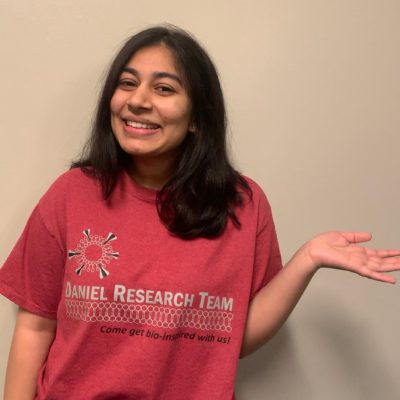Student Spotlight: Ambika Pachaury

November 7, 2022
Ambika Pachaury is a third-year doctoral student in biomedical engineering from Noida, India. She earned her B.S. in biomedical engineering at Boston University and now studies the interactions between the SARS-CoV-2 spike protein and the membrane components of cells under the guidance of Susan Daniel.
What is your area of research and why is it important?
My research area combines virology, membrane biochemistry, and biophysics. My project is looking to understand the interactions between the SARS CoV-2 spike protein and the membrane components of our cells. Although we already have vaccines against SARS-CoV-2, the mechanism by which it enters our cells is still being understood. My project is specifically focused on certain regions of the spike protein that are the first point of contact with our cell membranes. Using a top down approach from complex cell infection experiments to isolated peptide fluorescence experiments, I am able to piece together which membrane components affect the fusion and infection processes of the virus. This information can help us gain a better fundamental understanding of SARS CoV-2 virus entry and be better prepared for future pandemics.
What are the larger implications of this research?
Since certain regions of the spike protein are present in all coronaviruses, understanding how and why these regions interact so strongly with some components of the membrane can help us predict future pandemics. This can also help us create better viral drugs and vaccines that could be effective across all known and unknown coronaviruses. Additionally, it can inform future research to help doctors understand why some organs are targeted by SARS CoV-2 and not others, or why certain patients with pre-existing conditions are more or less likely to get infected by the virus. Lastly, this research provides a novel way to study coronaviruses since it combines biological, biochemical, and biophysical techniques and can fill in currently existing gaps of information.
What does it mean to you to have been awarded a National Science Foundation Graduate Research Fellowship?
It is truly a great honor to have received this fellowship. It means that others also resonate with my motivation and purpose for pursuing a Ph.D., and it also means that they think that my work is important and can contribute to society in a positive way. Receiving this fellowship inspires me even more to utilize all the resources that I am lucky enough to have and not only further my own research, but also contribute positively to others’ research and give back to society in a positive way. It validates my reason for pursuing science and, at the same time, solidifies my determination to become the best scientist I can be.
What will this fellowship allow you to do that you might not have otherwise?
This fellowship definitely opened doors for me and granted me the flexibility to take my project in different directions and collaborate with labs across Cornell. Even though I am a biomedical engineering Ph.D. student, I am able to work with labs in the field of chemical engineering and also collaborate with labs at the College of Veterinary Medicine that have expertise in viruses. The NSF fellowship is a great addition to my degree and I am grateful for access to resources and workshops with like-minded peers that allows me to work in an interdisciplinary space and truly bring novelty into my research work.
What are your hobbies or interests outside of your research or scholarship?
I really like reading murder mysteries and writing poetry. In my spare time, I like playing with my kitten, taking him on walks, doing yoga, and painting. I also have an evening ritual of making and drinking chai with my friends. Something I am passionate about outside of my research is women and STEM outreach. Last year I was the outreach coordinator for CBEW and organized the WOMEN event for high school students. I was also part of GRASSHOPR and other mentorship programs on campus. Volunteering for such events really helps motivate my work and I would like to continue giving back to my societies in some way or the other throughout my life.
Why did you choose Cornell to pursue your degree?
I chose Cornell to pursue my degree because there were many professors in biomedical engineering working on research that I was interested in. Additionally, during the open house for admitted students, I found that the department was very friendly and student-oriented. The department truly advocates for students and makes sure that each of us is able to fulfill our potential. Another great aspect was that there were few mandatory classes for Ph.D. students and, for the most part, we were allowed to choose whichever classes complemented and helped us in our research, which is very unique. Lastly, I was amazed by how interdisciplinary the research was and how much collaboration was involved not just in the department but across departments all over Cornell.
